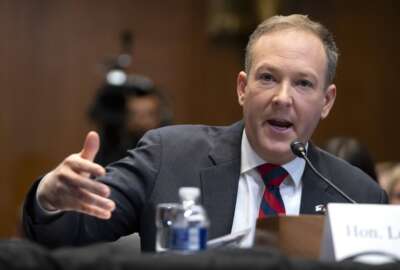First Look
Ernst presses SBA for details of 7(a) lender approval
SBA approved the American Lending Center as a non-federally regulated lender in its 7(a)-loan program in September.
The top Republican on the Senate Small Business and Entrepreneurship Committee is pressing the Small Business Administration for more details on its recent approval of a new lender for one of its programs.
Committee Ranking Member Joni Ernst (R-Iowa) is raising concerns about SBA’s approval of the American Lending Center as a non-federally regulated lender in its 7(a)-loan program.
SBA approved ALC as a non-federally regulated lender in the 7(a)-program last month.
The 7(a) loan program is the SBA’s primary means of helping startups and other small businesses obtain funding when they might not be eligible for business loans through other lending channels.
Under the 7(a) program, SBA does not make the loans. Instead, it guarantees a portion of loans made and administered through commercial lending institutions.
ALC is authorized by SBA to only make 7(a) loans in California.
The company is also approved for other SBA loan programs, including its 504-loan program, State Small Business Credit Initiative and pandemic-era Paycheck Protection Program.
ALC operates multiple regional centers designated by U.S. Citizenship and Immigration Services to utilize EB-5 investment dollars to create jobs in target economic areas throughout the U.S.
Under the EB-5 program, foreign investors — as well as their spouses and unmarried children under 21 — are eligible to apply for lawful permanent residence in the U.S. if they invest a minimum of $900,000 in a U.S. commercial enterprise and plan to create or preserve at least 10 permanent full-time jobs for qualified U.S. workers.
According to State Department visa data, more than 60% of those admitted to the U.S. through the EB-5 program in fiscal 2023 were from China.
ALC, according to a press release last year, is the only small business lender that combines SBA’s loan programs with the federal government’s EB-5 program.
Ernst, in a letter to SBA Administrator Isabel Guzman, said “any investor based in the People’s Republic of China with sufficient resources to participate in the EB-5 program is much more likely to be connected to or an active member of the Chinese Communist Party, making their investments in the United States potentially adversarial in nature.”
“ALC will now be able to directly pick and choose American small businesses to invest in, backed by capital from foreign nationals predominantly from China. If these loans default, Americans will be the ones paying ALC’s investors back,” Ernst wrote.
John Shen, ALC’s founder and CEO, said in a statement on the company’s website that its approval as a 7(a) lender “opens the door for us at ALC to help many Californian small businesses get the capital they need to succeed.”
In a letter last month, Acting SBA Office of Financial Assistance Director Alejandro Contreras said SBA is “satisfied that the applicant has met the requirements to become an SBA 7(a) loan program participant.”
According to Contreras, SBA reviewed the company’s internal control policies, lending policies and procedures, organizational structure, management structure and business plan.
Among her questions, Ernst is asking SBA to provide documentation supporting its approval of ALC as a 7(a) lender. She is also asking SBA how many 7(a) and 504 loans ALC or its affiliates have made since its founding in 2009.
Federal News Network has reached out to SBA and the American Lending Center for comment.
Ernst told Federal News Network in a statement that SBA “needs to be doing everything in its power to lower costs instead of putting Americans on the hook for potentially risky loans.”
“I am holding the SBA accountable and demanding answers about what vetting was done for the nonbank lenders they are licensing to make SBA loans,” she said.
Copyright © 2025 Federal News Network. All rights reserved. This website is not intended for users located within the European Economic Area.
Jory Heckman is a reporter at Federal News Network covering U.S. Postal Service, IRS, big data and technology issues.
Follow @jheckmanWFED






